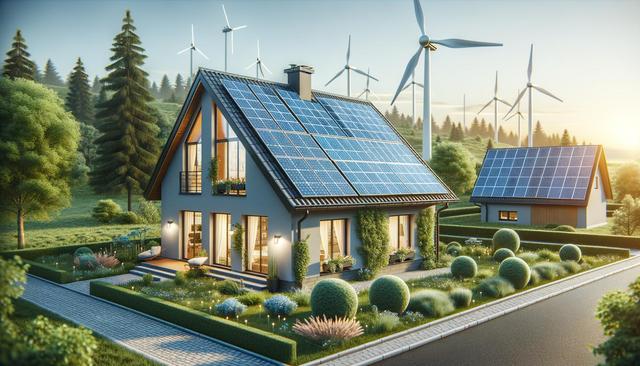Understanding Energy Efficiency in Solar Systems
Energy efficiency is a core aspect when considering solar energy for your property. It refers to how effectively a solar power system converts sunlight into usable electricity. The efficiency rate can vary depending on factors such as panel type, installation angle, and shading. Higher efficiency panels generally produce more energy in less space, making them suitable for rooftops with limited surface area. However, it’s important to weigh efficiency against cost and installation complexity.
When assessing efficiency, keep in mind the following contributing factors:
- Solar panel technology (monocrystalline, polycrystalline, thin-film)
- Placement and orientation relative to the sun
- Temperature and local climate conditions
- System maintenance and cleanliness
Maximizing energy efficiency also involves ensuring your home is energy-conscious overall. This includes upgrading insulation, sealing leaks, and using energy-efficient appliances. A well-prepared property allows your solar system to perform at its full potential while reducing your overall energy demand.
Installation Basics: What to Expect
Installing a solar system involves several essential steps that ensure both safety and performance. Whether you’re opting for rooftop panels or a ground-mounted system, the process typically begins with a site assessment. This includes analyzing your roof’s condition, shading concerns, and daily sun exposure. After the assessment, a system design tailored to your energy needs and property layout is created.
The installation process itself often includes:
- Securing permits and approvals from local authorities
- Mounting the solar panels on your roof or location of choice
- Connecting the system to your home’s electrical infrastructure
- Installing an inverter to convert solar DC to usable AC power
- Testing and commissioning the system
Most installations are completed within a few days, depending on system size and complexity. It’s important to work with certified professionals who are familiar with local codes and regulations to ensure a smooth and compliant setup.
Optimizing for Long-Term Use
Once your solar system is up and running, long-term performance depends on proper use and care. Regular monitoring and maintenance are key to ensuring the system continues to deliver reliable energy. While solar panels generally require little upkeep, occasional cleaning and inspections can help identify issues like dirt buildup, shading from new construction, or electrical faults.
To enhance long-term efficiency, consider the following:
- Monitor your energy production through an app or web portal
- Schedule periodic inspections by a qualified technician
- Trim trees or vegetation that may grow and block sunlight
- Check your inverter and other system components regularly
Most solar systems come with warranties that span 20 to 25 years, covering performance and equipment. Ensuring timely servicing and staying informed about your system’s output allows you to protect your investment and enjoy dependable energy for decades.
Financial Considerations and Incentives
Exploring solar options also means understanding the financial side of things. While the upfront cost of solar installation can be significant, various incentives and financing methods can make it more accessible. From tax credits to state-level rebates, homeowners can reduce their initial investment and improve the return on their solar energy system.
Common financial tools include:
- Federal and local tax credits
- Solar renewable energy certificates (SRECs)
- Net metering programs that credit you for excess energy sent to the grid
- Loan and lease options for spreading out costs over time
When evaluating the economics, it’s essential to consider your current energy usage, future plans (e.g., electric vehicles, home expansions), and your local utility rates. Over time, many property owners find that solar systems pay for themselves through reduced electricity bills and increased property value.
Environmental Impact and Property Value
One of the most compelling reasons to adopt solar energy is its positive environmental impact. Solar systems help reduce reliance on fossil fuels, lowering your carbon footprint and contributing to cleaner air and water. For environmentally conscious homeowners, this can be a strong motivation to switch to renewable energy sources.
In addition to ecological benefits, solar installations can enhance property value. Numerous studies suggest that homes equipped with solar panels often sell faster and at a higher price compared to similar properties without them. Buyers are increasingly interested in energy-efficient features, especially as utility costs continue to rise. By investing in solar, you’re not only saving on energy but also potentially increasing the market appeal of your home.
Moreover, solar systems symbolize a commitment to sustainability, which can resonate well within your community. Whether you’re motivated by cost savings, environmental concerns, or both, solar energy presents a practical and responsible solution for long-term energy use.
Conclusion: Making a Sustainable Investment
Exploring solar options for your property is a meaningful step toward energy independence and environmental responsibility. From understanding energy efficiency to managing installation and maintenance, solar energy systems offer a reliable and forward-thinking solution. By taking the time to evaluate your property’s suitability, financial opportunities, and long-term goals, you can ensure that your investment pays off in both economic and ecological terms. Whether you’re looking to reduce monthly expenses or contribute to a greener future, solar power provides a pathway that aligns with modern energy needs.




Leave a Reply